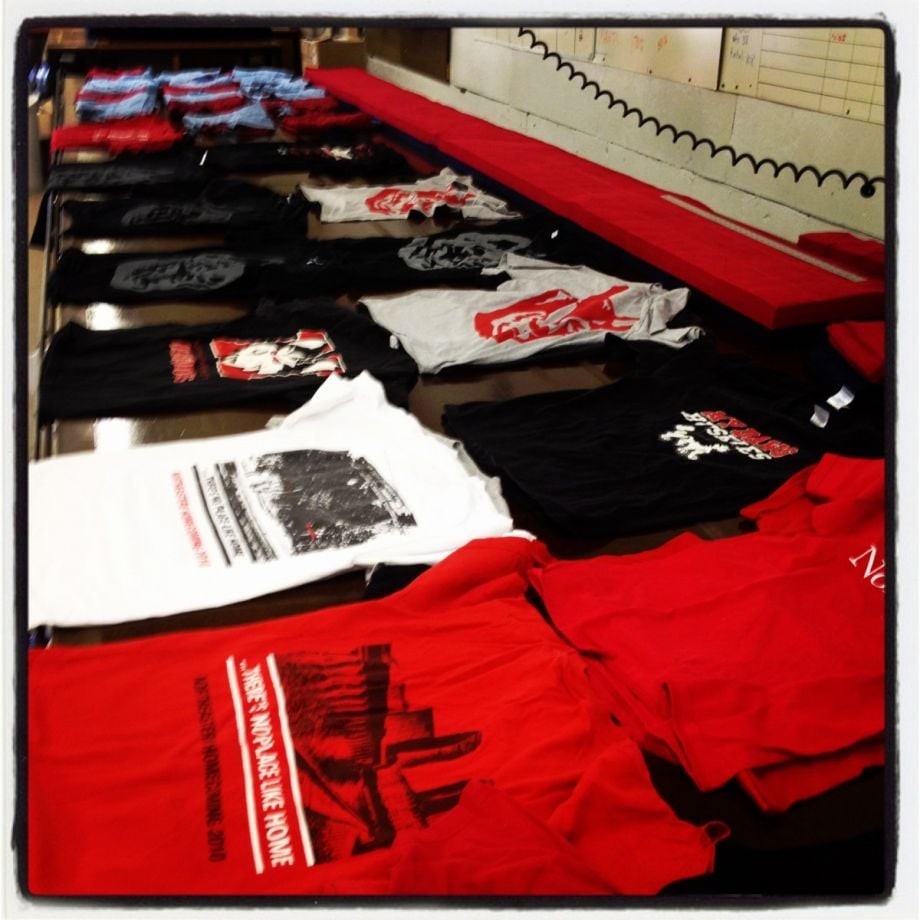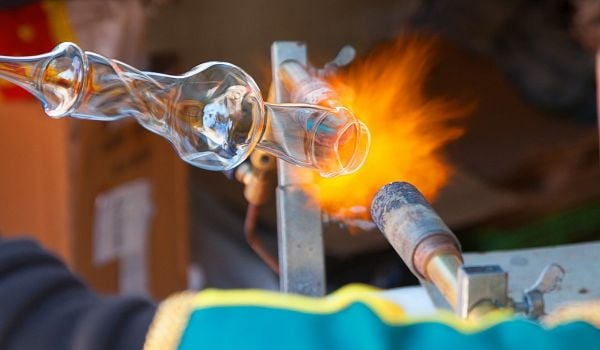Carlos Gasper usually pulls the loading dock door open around 10am, letting in the sun that illuminates the factory floor.
A middle-aged Guatemalan-American, Gasper is co-founder, along with Molly Hemstreet and Miriam Domingo, of the worker-owned cut-and-sew enterprise Opportunity Threads in Morganton, N.C. In the fall of 2008, at the start of the Great Recession, the trio pulled together to create the lean manufacturing startup in the headlands of western North Carolina. Today the company employs six nine people and works with clients from around the country.
Though far from the policy debate in Washington, companies like this are on the frontlines of one topic President Obama highlighted in his state of the union — insourcing.
In his third address to the country, Obama mentioned the word “manufacturing” three times more than “Afghanistan.” He spoke early and often about an industry that at one point transformed the country, but in more recent times has become a symbol of its decline. Himself the grandson of an assembly worker, Obama proposed reinvesting in the nation’s education system that would “attract a new generation of high-tech manufacturing and high-paying jobs.”
While some companies, such as the multinational engineering conglomerate Siemens, have opened manufacturing operations in the U.S., it hasn’t yet been enough. The manufacturing sector lost 16.3 percent of its jobs between 2007 and 2009, according to the Information Technology and Innovation Foundation, and only 1.4 percent of those jobs have come back since.
But with traditional manufacturing jobs decreasing or gone, there is an opportunity to innovate in the field. When people think of good jobs, they don’t typically picture the sweatshops of 100 years ago, or those offshore that some companies (like Apple) still rely on. But to change old habits and trends, there needs to be a willingness to try new models and not repeat the same mistakes.
North Carolina was once at the center of the U.S. manufacturing industry. According to Ted Baker, professor of Textiles and Entrepreneurship at North Carolina State, the brahmin leaders of the mills of Massachusetts failed to reinvest in new technology, which sparked a migration to the South. (Also helping things was a surplus of exploitable, and inexpensive, labor, thanks to the legacy of slavery.) In Winston-Salem, down tobacco road, the cigarette companies employed thousands and pumped millions of dollars into the community. In Burke County, home to Opportunity Threads, there was once the longest stretch of furniture outlets in the country, thanks to massive factories nearby.

Credit: Nathan Rothstein
But years later, as cheap labor pushed companies offshore, the larger manufacturing companies once again failed to innovate. The story of outsourcing repeated itself from the western part of the state to the eastern seaboard: The larger, more traditional factories failed to adapt to a changing market. For years, a manufacturing company could expect minimum orders from one company to range from 25,000 to 100,000 per order, but as the 20th Century turned into the 21st, those big orders went to the factories in the developing world. When companies trying to introduce prototypes called and asked for a smaller order, the larger manufacturing companies refused. In the end, the factories chose no order over a smaller order. Instead of cutting a hundred jobs, they had to close down entirely. From 1997-2002, the state of North Carolina lost more than 100,000 jobs in the textile industry.
Many of the employees at Opportunity Threads once lived in Los Angeles, and through family networks had moved to Morganton in the past decade. The first migration of Guatemalan immigrants arrived in North Carolina after the genocide of Mayans in the late 1980s, which is detailed in labor historian Leon Fink’s book, The Maya of Morganton. (Fink interviews Don Hemstreet, Molly’s father, who manages the operations of Opportunity Threads.)
Originally from Morganton, Molly Hemstreet had spent time teaching in public schools, and also working on different worker rights issues, when she met Gasper and Domingo and helped start the cooperative. She has no interest in creating another manufacturing plant that produces uniforms for prisons and hospitals, like many nearby plants. Instead, the younger Hemstreet wants the cooperative to be part of an eco-friendly business cycle that she hopes will eventually help, as the company’s website says, “reverse the trend of anti-environmental manufacturing and worker marginalization that has plagued Appalachia.”
She has a long road ahead. For the past few decades, the state legislature has de-regulated environmental safety measures in effort to attract hog manufacturing plants that slaughter up to 39,000 pigs a day. You can imagine this is not a pretty affair.
But for this next generation of Burke County enterprise, there is hope that a series of startups can bring new ideas to the market — and a place like Opportunity Threads can help prototype the ideas. Elsewhere in North Carolina, other companies like recycled-clothing producer Recover Brands are attempting their own reclamation of the state’s textile history.
As these companies grow, the hope is that they will be able to hire, pulling from long wait lists as well as from the population of unemployed and underemployed people that are the legacy of the state’s contracting manufacturing base.
North Carolina was once the textile center of the U.S. where most of our t-shirts were produced. Many of the plants went out of business long ago. Unlike in Lowell, Mass., there are no shrines, no historical plaques. But instead of building a museum to honor the history, companies can rewrite a new version — one that ultimately helps fuel, as our president said, “an economy built to last.”
Nathan Rothstein is president of Project Repat.








